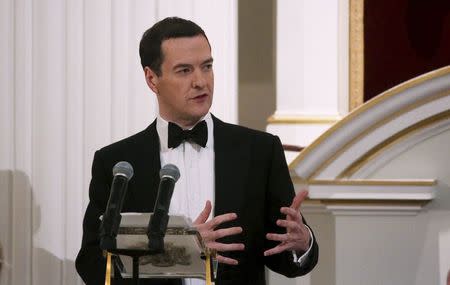Osborne seeks safeguards against EU's 'ever-closer union' mantra
By William James LONDON (Reuters) - Britain wants a guarantee from the European Union that it will not be penalised for remaining outside the euro zone, Chancellor George Osborne said on Wednesday, setting out one key demand in London's renegotiation with the bloc. Britain's membership of the EU will be put to a referendum before the end of 2017 once Prime Minister David Cameron and Osborne, his most senior political ally, have renegotiated the country's ties to the bloc. Osborne used a major speech to London's most powerful financiers to spell out his desire to rewrite one of the EU's guiding principles: that all members are committed to ever-closer union. That phrase, used in the 1957 Treaty of Rome that laid the foundations for the modern EU, is at odds with Britain's decision not to adopt the euro currency and is seen by some to threaten its position as a global financial centre and its status within the bloc. "Even the most pro-European in the room would, in time, come to question the benefits of British membership of the EU if we did not tackle these issues now," Osborne told a black-tie dinner in the heart of London's financial district. "It is a particular challenge for the UK – and one that was not envisaged in the EU Treaties." Cameron has said he wants to keep Britain inside the EU, but also that he cannot rule anything out if he is unable to secure the reforms he wants, which also cover market regulation, welfare rules and lawmaking sovereignty. "Among the principles we seek to establish in this re-negotiation are these simple ones: fairness between the euro-ins and the euro-outs enshrined, and the integrity of the single market preserved," Osborne said. His remarks reflect the concerns that the process of closer integration between euro zone states, spurred by the near-meltdown of its financial system earlier this decade, could ultimately leave Britain on the sidelines of financial policymaking. "MISGUIDED" LAWS "One of the greatest threats to our international competitiveness comes from ill-designed and misguided European legislation," Osborne said. He referred to a recent example where the European Central Bank had tried to insist that euro clearing houses should be based in the single currency area. "That was a fundamental challenge to the principle of the single market, which we successfully overturned in the court," Osborne said. "It points to the looming challenges ahead, when proposals like their financial transaction tax are developed." Only Britain and Denmark, which both joined the bloc in 1973, have a legal opt-out from the single currency. The other 26 EU member states have either already adopted the euro or are committed to doing so. "It's in our interests that the euro is a successful, strong currency. So we're prepared to support the euro zone as it undertakes the further integration it needs," Osborne said. "But in return, we want a settlement between the UK and the euro zone that protects the single market and is stable, fair and lasts." The possibility of Britain, the world's fifth-largest economy, withdrawing from the EU and losing unfettered access to its 500 million-strong single market has set London's financial sector on edge. In May, Deutsche Bank revealed it was considering cutting down its UK operations should the country pull out, and a lobby group has said a number of banks have put off possible investments in Britain until after a referendum. (Editing by Hugh Lawson and Gareth Jones)

 Yahoo News
Yahoo News 

